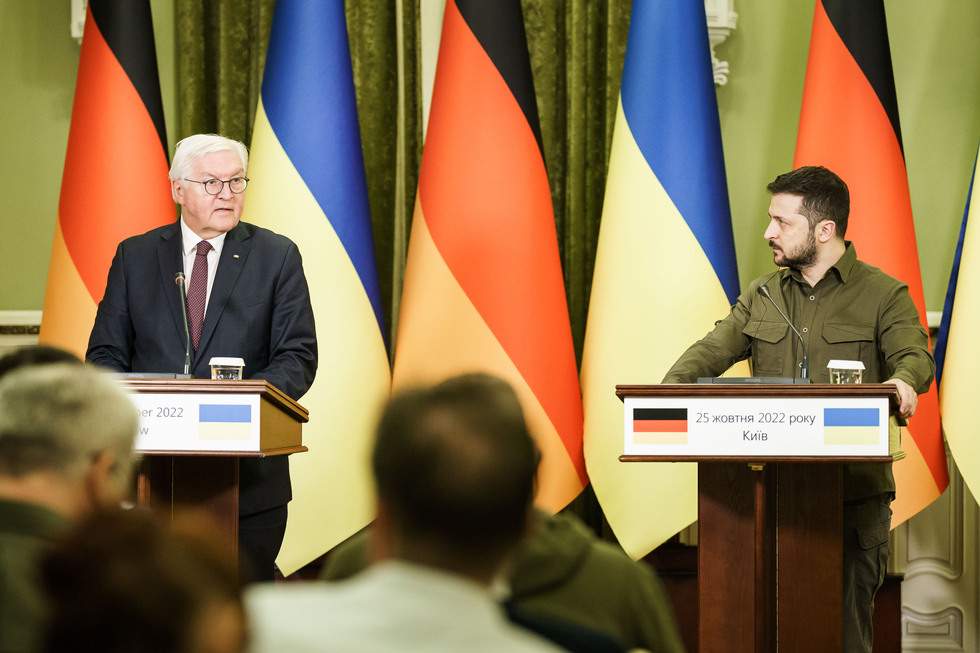If Russia is the villain in the geopolitical drama now convulsing Europe, Germany is the most convenient scapegoat. For decades, decision-makers in Berlin gullibly and greedily put ties with Russia ahead of the interests of their European neighbors. From foot-dragging on NATO expansion and sweetheart deals on gas pipelines, to going easy on Russian espionage and performative anti-Americanism, the charge sheet is lengthy.
The resulting mistrust, resentment, and outright contempt now felt by many countries on Europe’s front line overshadows Germany’s better side. This includes the forceful eloquence of the Green politicians Annalena Baerbock (foreign minister) and Robert Habeck (economics), the generosity of the German public to Ukrainian refugees, and the enormous planned increase in the country’s defense budget. Artis Pabriks, Latvia’s defense minister (and, full disclosure, an old friend of mine) put it well at a recent conference in Berlin by asking bluntly “We are willing to die for freedom. Are you?”
Now Germany’s president, Frank-Walter Steinmeier, has weighed in a state-of-the-nation speech about his country’s role in a changing world. “In the face of evil, goodwill is not enough,” he declared. In most contexts, that would be a platitude. In a country that has elevated sanctimonious, self-interested spinelessness to the level of statecraft, it counts as a zinger. “There is no place for old dreams,” said the man who as foreign minister epitomized the complacency of post-1991 western Europe. Having finally made a visit to Kyiv, Steinmeier also expressed ringing support for a Ukrainian victory and a Russian defeat.
As with the speech made in Prague in August by Olaf Scholz, these sentiments are welcome. Germany’s head of government apologized for his country’s smug indifference to the fate of eastern Europe under communism, explicitly supported expanding the European Union, and underlined his commitment to financial and military aid for Ukraine. Those who focus only on Germany’s shortcomings should contemplate Europe’s plight if Gerhard Schröder, or someone like him, were running the European Union’s largest country.
But praise for Germany’s awakening is mixed with justified exasperation. As Thomas Kleine-Bockhoff of the German Marshall Fund think tank noted, “what took Steinmeier so long?” The trigger seems to have been a visit to Ukraine, where an air raid prompted a formative, unscheduled trip to a bomb shelter. But as the former standard-bearer of the old regime during his time in government, Steinmeier could and should have made these points with great effect six months ago. Then he would have led the pack. Now he is following it.
A second failing is a lack of urgency. Germans are paying a tiny price relative to that borne by Ukrainians, who are fighting and dying not just for their own country, but for all of Europe. The glacial pace of German foreign policy evolution may suit its well-upholstered salons, but it is jarringly self-indulgent seen from the outside. Every hour’s delay in helping Ukraine costs lives.
That leads to the most striking failing in Steinmeier’s speech: a lack of contrition. Tens of thousands of people are dead. Millions of lives are shattered. The damage is a trillion dollars. This comes not from a natural disaster. It is the direct result of the naïveté and greed of the old West, which has ignored 30 years of warnings about recrudescent Russian imperialism. And almost nobody, least of all Germans, is expressing remorse for this.
Huge dangers and difficulties still lie ahead in an era where Europe’s strategic nakedness is starkly displayed. Germany’s economic, political and military clout will be vital, first in ensuring Ukraine’s victory and then in rebuilding European security. Outsiders realize this. I am not sure Germans do.
Europe’s Edge is CEPA’s online journal covering critical topics on the foreign policy docket across Europe and North America. All opinions are those of the author and do not necessarily represent the position or views of the institutions they represent or the Center for European Policy Analysis.





